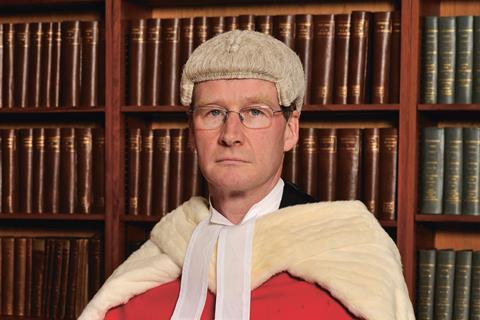A Court of Appeal ruling raising what the judges called ‘important points of law about the scope of legal professional privilege’ is the latest judgment in the long-running litigation over international firm Dechert’s former conduct in the Middle East.
In Al Sadeq v Dechert LLP, three judges unanimously allowed the appeal of Karam Al Sadeq, a Jordanian lawyer detained in Ras Al Khaimah for the past nine years. The judgment orders Dechert to re-review its disclosure following allegations that the firm, which acted for the Ras Al Khaimah Investment Authority, incorrectly withheld or redacted materials from Al Sadeq’s legal team.
Al Sadeq is suing Dechert and three former partners, including former head of white collar crime Neil Gerrard, over their part in alleged human rights abuses. He was appealing a judgment last year which found that material he sought was subject to legal professional privilege.
In lead judgment, Lord Justice Popplewell (pictured) said the case involves the so-called ‘iniquity exception’ to privilege. ‘Where there is a prima facie case of iniquity which engages the exception, there is no privilege in documents and communications brought into existence as part of or in furtherance of the iniquity,’ he said.

However, describing Dechert’s previous approach to disclosure as ‘overly narrow’, the judge said: ‘The exception is not limited to documents created in furtherance of the iniquity, nor those which are part of it.’
Categories of conduct which would engage the exception would include kidnapping and extraordinary rendition, unlawful detention, torture and inhumane treatment, he said.
Allegations of such iniquity made by Al Sadeq had not been contradicted or disputed by any factual evidence adduced on behalf of the respondents, the judge said. Had Al Sadeq’s 2014 arrest in Dubai been lawful, it would have been in the respondents’ interests to say so. The judgment refers to notes which record that Al Sadeq was held in solitary confinement for 13 months in a ‘brutal legal system’.
Granting the appeal, the judge invited the parties’ views on the form of an appropriate disclosure order. Lord Justice Males and Lord Justice Underhill agreed.
In an endnote to his lead judgment, Lord Justice Popplewell criticised the ‘unacceptably long and regrettable’ delay in the High Court’s judgment.
‘Delay, even inordinate and inexcusable delay, is not in itself a ground for allowing an appeal,’ he said. ‘But where there has been lengthy delay an appellate court has to exercise special care in reviewing the judge’s findings of fact and reasoning.’
However, Popplewell concluded that in this case the delay ‘has not ultimately affected the approach to determining the issues’.
A spokesperson for Dechert LLP said: 'The firm is considering the Court of Appeal’s detailed judgment clarifying questions of legal professional privilege, noting that the firm is professionally obliged to maintain its client’s privilege and has endeavoured to do so with care and diligence.'


























